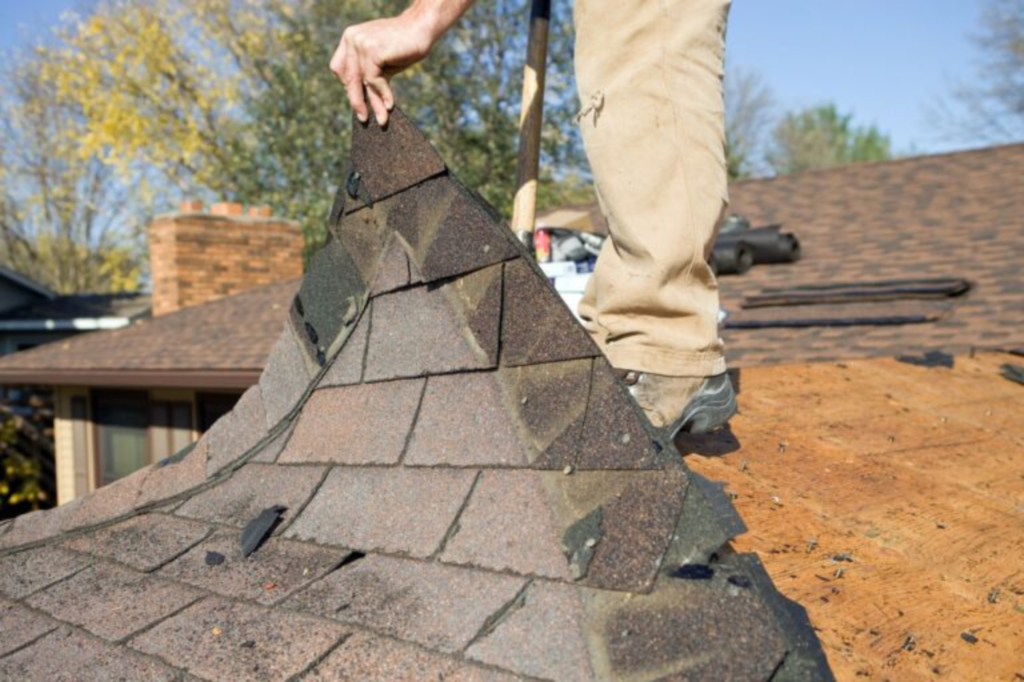To determine if your roof needs repair in Fort Worth, first consider its age and weather exposure. If you’ve asphalt shingles over 15 years old, be aware they may need replacing. Check your shingles for cracks, damage, or missing pieces, and scan your gutters for shingle granules. Inside your home, watch for discolored patches and damp spots on ceilings and walls, indicating possible leaks. Unusual spikes in your energy bills can signal a poorly sealed roof. Professional inspections twice a year, spring and fall, catch minor issues before they evolve into costly problems. More invaluable tips await you as you progress.
Key Takeaways
- Inspect your roof for external signs of damage like cracked or missing shingles, particularly after Fort Worth’s extreme weather events.
- Check for internal signs of roof trouble, such as discolored patches or damp spots on ceilings and walls, indicating potential leaks.
- Look for any sagging in the roof structure, indicating severe underlying issues that require immediate attention.
- If you notice a sudden increase in your heating or cooling bills, it could indicate poor roof sealing and the need for repair.
- Regular professional inspections, especially after hailstorms and high winds in Fort Worth, can help identify minor issues before they become major problems.
Understanding Roof Lifespan
Understanding the lifespan of your roof is the first step towards effective maintenance and repair.
It’s vital to know that the average lifespan of a roof can vary greatly depending on the materials used. Asphalt shingles, commonly used in Fort Worth, generally last between 15 to 30 years. On the other hand, metal roofs can endure for about 40 to 70 years, while tile and slate roofs can impressively last over a century.
However, the lifespan isn’t just about materials. It’s also about the craftsmanship of installation, the quality of maintenance, and the harshness of weather conditions. In Fort Worth, for example, roofs often face harsh weather, including hailstorms and extreme temperature fluctuations, which can shorten a roof’s lifespan.
Regular inspections and timely repairs can greatly extend your roof’s life. So, if you notice wear and tear, don’t ignore it. Small issues can quickly become major problems if neglected.
Always remember that a well-maintained roof not only protects your home but also contributes to its value and curb appeal. Make sure you take the necessary steps to prolong your roof’s lifespan.
Spotting External Roof Damage
Now that you’re aware of how various factors impact your roof’s lifespan, let’s shift our focus to spotting external roof damage.
Even minor issues can lead to significant problems if left unattended, so it’s essential to inspect your roof regularly.
Start by looking at the shingles. Are they intact, or do you see any that are cracked, damaged, or missing?
These are clear signs of wear and tear. Also, look for granules in the gutter, which indicate that your shingles are deteriorating.
Next, check the flashings around chimneys, vents, and skylights. If they’re damaged or missing, water can infiltrate your roof, causing leaks.
Remember to inspect the roof’s overall structure. If it’s sagging, there could be underlying issues, possibly severe ones.
Finally, look for signs of moss or algae. While they mightn’t seem threatening, they retain moisture, which can damage your roof over time.
Interior Signs of Roof Trouble
While examining your roof’s exterior is essential, don’t overlook the importance of checking inside your home for signs of roof trouble. Look for any obvious signs of water damage, such as discolored patches or damp spots on your ceiling and walls. These could indicate a leak in your roof, potentially leading to costly repairs if not addressed promptly.
Inspect your attic for damp insulation and beams. Moisture in your attic can cause structural damage over time, so it’s important to catch it early.
Another sign of roof trouble can be an unexpected increase in your heating or cooling bills. If your roof isn’t properly sealed, it can lead to significant energy loss.
Lastly, be aware of any musty, moldy smells in your home, particularly in the upper levels. These can indicate water intrusion and potential roof damage.

Weather-Related Roof Issues
Given the climate in Fort Worth, weather-related roof issues are a significant concern for homeowners.
Extreme weather conditions, such as hailstorms, high winds, and temperature fluctuations, can threaten your roof’s integrity.
Hailstorms, common in our area, can damage shingles, leading to leaks or even more significant damage. High winds, on the other hand, may loosen or tear off shingles, leaving your roof vulnerable.
Additionally, the hot summers and cold winters cause roofing materials to expand and contract, which could lead to cracks and other problems.
Temperature changes aren’t the only concern. The sun’s ultraviolet (UV) rays can cause your roof materials to degrade over time.
This might result in a loss of waterproofing abilities, which can lead to leaks and water damage.
Importance of Regular Roof Inspections
Regular inspections are essential to safeguard your home from potential roof damage. Think of them as a health check-up for your roof. Just as you wouldn’t skip a doctor’s appointment, you shouldn’t neglect your roof’s needs.
You see, a lot can happen over a year in Fort Worth. The harsh sun, heavy rains, and hail can all cause wear and tear that might go unnoticed to an untrained eye. Regular roof inspections help catch minor issues before they become major problems, saving you time, stress, and money in the long run.
Most roof experts recommend two inspections a year, ideally in the spring and fall. This way, you can identify any damage caused by the extreme weather conditions of winter and summer and address it promptly.
During an inspection, look for signs of damage, such as missing shingles, leaks, or moss growth.
However, remember that not all damage is visible from the ground or to an untrained eye. That’s why it’s a good idea to hire a professional for a thorough inspection. They’ll know exactly what to look for and can provide an accurate assessment of your roof’s health.
Hiring Professional Roof Repair Services
Why risk your safety or the integrity of your roof by trying to handle repairs on your own? It’s important to understand when it’s time to call in the professionals. Trained roofers have the knowledge, experience, and equipment to assess and repair roof damage safely, ensuring the longevity of your home’s top layer.
Whether you’re dealing with missing shingles, water leaks, or structural issues, professional roof repair services Fort Worth can handle it all. They’ll conduct a thorough inspection, accurately identify the problem, and recommend a suitable solution.
Plus, they’re up-to-date on Fort Worth’s local building codes and regulations, ensuring your roof stays compliant.
Sure, it might be tempting to do minor roof repairs yourself, but remember, even small issues can escalate if not handled correctly. You might save some money upfront, but improper repairs could result in higher costs in the long run.
In Fort Worth, where weather conditions can be harsh and unpredictable, it’s even more vital to have a reliable, professional roofer to turn to.
Don’t compromise your home’s safety; invest in professional roof repair Fort Worth when necessary.
In Summary
Knowing when your roof needs repair can save you from expensive damages down the road. Be mindful of your roof’s age, look for external damage, and keep an eye out for interior signs of trouble. Don’t ignore weather-related issues, and remember, regular inspections are key. When in doubt, hire a professional. You’re not just maintaining a roof; you’re protecting your home in Fort Worth against the elements, ensuring its longevity and your peace of mind. For expert assistance, consider Secured Roofing for your Fort Worth roof repair needs to keep your roof in top condition.

